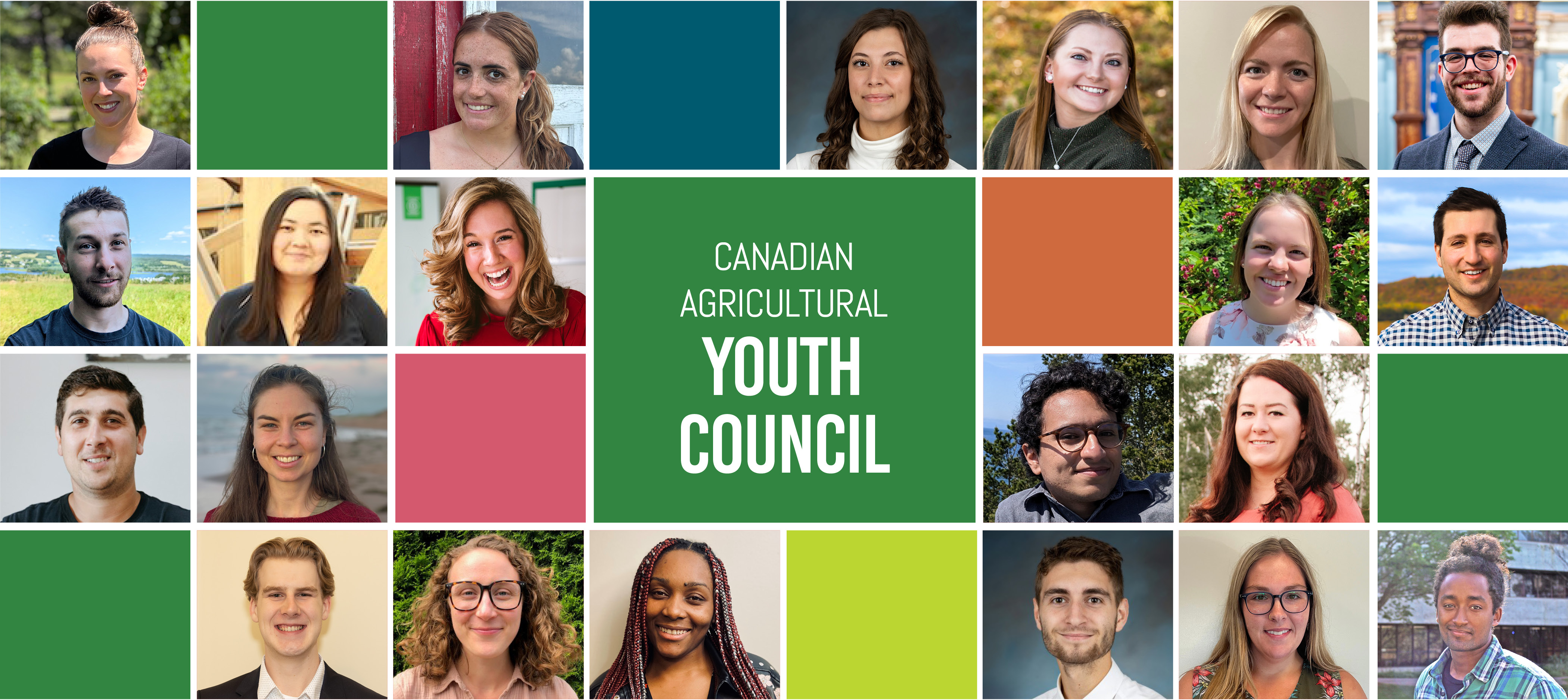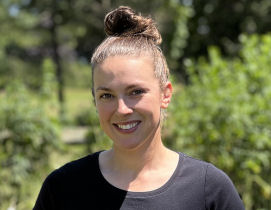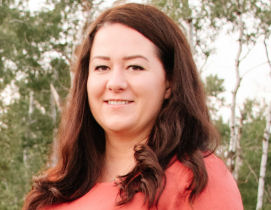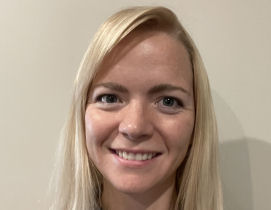
Young Canadians are dynamic, engaged and passionate about the future of the agriculture and agri-food sector, and giving them a voice at the table is an important commitment of the Government of Canada.
As a consultative body to Agriculture and Agri-Food Canada (AAFC), the Canadian Agricultural Youth Council (CAYC) is a group of young Canadians providing advice, enabling on-going dialogue on food-related challenges and opportunities, sharing information and best practices, and advising on the strengths and weaknesses of policies and programs affecting the agriculture and agri-food sectors.
On September 10, 2024, Agriculture and Agri-Food Minister Lawrence MacAulay announced the members of the third cohort of the CAYC.
If you have any questions or would like to connect with the Canadian Agricultural Youth Council, please send an e-mail to aafc.youthcouncil-conseildelajeunesse.aac@agr.gc.ca.
Canadian Agricultural Youth Council
Video transcript
[Upbeat music begins.]
[A colourful grid appears on screen, containing portraits of each member of the Canadian Agricultural Youth Council.]
Text on screen: Canadian Agricultural Youth Council
[A close-up view of each member in a square rapidly appears on screen, one after another, talking to the camera. Flashing colourful squares appear around the members.]
Hi.
Hello.
Hi.
My name is Chantele Gouliquer.
Paul Hrycyk.
Andrea De Roo.
Samuel Lanctôt.
Sameeha Jhetam.
From Nova Scotia.
From New Brunswick.
From Barriere, British Columbia.
Gaspé, Quebec.
And I’m from Embrun, Ontario.
I’m an integrated pest management consultant.
I’m an egg farmer and a grape grower.
I’m a dairy producer and agronomist.
I’m a dairy, poultry and cash crop farmer.
I am a community education manager.
I’m a member of the Canadian Agricultural Youth Council.
The Canadian Agricultural Youth Council.
Canadian Agricultural Youth Council.
Text on screen: Canadian Agricultural Youth Council
[Colorful squares surround the on-screen text with a faded background of a CAYC meeting of the members in the background. Cut to the meeting appearing on the screen. The male narrator begins talking.]
Narrator: The Canadian Agricultural Youth Council provides the federal government with advice on agricultural policies, programs, hot issues, the environment, food and the future.
[A montage of the members sitting and talking next to each other at a round table layout.]
[Cut to a quick montage of each member in a square rapidly appearing on screen, one after another, talking to the camera. Flashing colorful squares appear around the members.]
The future of agriculture is collaborative.
Regenerative.
It’s innovative.
Precision.
Transparency.
Data-driven decision making.
Sustainability.
Next generation of farmers.
It’s caring for each other.
Farm-led innovation.
It’s people.
Digital and regenerative.
Innovation.
Is a myriad of possibilities.
[A close-up view of the members in their squares as the camera rotates between each member while they talk to the camera.]
I am the future of agriculture.
I am the future of agriculture.
I am the future of agriculture.
[The camera pans out and displays the entire grid of the members as they all speak at the same time.]
We are the future of agriculture.
Text on screen: Learn more at Agriculture.Canada.ca/EN/Youth/Canadian-Agricultural-Youth-Council
Text on screen: Agriculture and Agri-Food Canada – Agriculture et Agroalimentaire Canada
[Upbeat music ends]
[Government of Canada wordmark.]
[End]
Meetings
CAYC members meet several times a year to discuss issues that matter to their peers, their community and their sector.
-
Highlights: January 28, 2025 (via video conference)
- On January 28, the Canadian Agricultural Youth Council (CAYC) continued its strategic planning process. Potential activities and outcomes for the CAYC were developed based on discussions held during the September 20, 2024, and November 27-28, 2024, meetings. Members identified priority outcomes for Cohort 3 related to fostering domestic and international relationships, developing a gap analysis on programming barriers for youth in agriculture, and positioning the CAYC as a priority resource for AAFC and other departments and agencies. Members participated in breakout groups to discuss and refine workplans and key milestones to achieve the desired outcomes.
- Agriculture and Agri-Food Canada’s Programs Branch delivered a presentation on the Producer Mental Wellbeing Initiative, developed in partnership with Impact Canada. This initiative seeks to address mental health challenges faced by Canadian farmers by encouraging innovative ideas that create support systems, address stigma, and promote peer-led initiatives. The challenge is currently in its testing phase, and CAYC members were invited to provide their insights individually through interviews and through discussion during the meeting. Feedback from the CAYC included notes on the challenges that producers have in accessing existing resources, and indicated participants in the challenge could benefit from access to advisors and experts as they progress in the challenge.
- The next virtual meeting of the CAYC is tentatively scheduled for March 19, 2025.
-
Highlights: 2024
Highlights: November 27 and 28, 2024 (In-person and via video conference)
- Keith Mussar, industry co-chair of both the Agile Regulations Table and the Leadership Table (of the Sector Engagement Tables), met with Youth Council members and outlined the Sector Engagement Table model, focusing on how CAYC members can be incorporated into SET work via roles on tables and working groups.
- Deputy Minister Lawrence Hanson provided remarks noting that CAYC members should consider the unique perspective they can bring to the table, noting priorities around diversity and inclusion in the sector, harnessing the potential of technology and data in the sector, and preparing for inter-generational transfer of operations between retiring farmers and new entrants.
- Francis Drouin, Parliamentary Secretary to the Minister of Agriculture and Agri-Food, provided a keynote address to close the meeting, noting the CAYC's leadership at the youth hackathon at this year's G7 summit in Italy. M. Drouin also encouraged the CAYC to continue to drive key discussion topics to advance the economic and environmental sustainability of the sector.
- The CAYC, joined by other young agricultural leaders, participated in the Youth Secretariat's first in-person consultation for the Second State of Youth report, which is anticipated to be published in the summer of 2025. CAYC members and youth delegates provided their current views and concerns for the future, and listed the opportunities that exist for young people in Canada.
- The CAYC also met with several federal government officials to provide advice and input on emergency management in the agricultural sector, climate risk in Business Risk Management programming, and the Canadian Agricultural Loan Act Program.
- The CAYC held a discussion with peers from the American Farm Bureau Federation's Young Farmers and Ranchers program on common issues for youth and new entrants in Canadian and American agriculture. Participants emphasized the importance of supporting inter-generational transitions in farming, balancing environmental and financial sustainability, and addressing gaps in capital investment and processing infrastructure.
Highlights: October 25, 2024 (via video conference)
- This meeting was the first formal meeting of the third Cohort of the Youth Council.
- The first presentation delivered by Donald Boucher, Director General of AAFC's Sector Development and Analysis Directorate, provided an overview of Agriculture and Agri-Food Canada as a federal Department, and how agriculture policy priorities are established and implemented collaboratively with provincial and territorial governments. The presentation also touched on the role of the Youth Council in the overall AAFC Sector Engagement Table model, and how the Youth Council contributes to the Department's mandate.
- The second presentation was delivered by Joanne Allen, industry co-chair of the Skills Development Table under the Sector Engagement Table model. She was joined by Laurie Loane from Agriculture in the Classroom PEI, and Kalysha Hanrahan from Agriculture in the Classroom. This presentation provided CAYC members with a chance to hear from other Sector Engagement Table participants and how their table advances its priorities. CAYC members noted common priorities between the Council and the Skills Development Table. The Youth Council members had the opportunity to highlight how to better engage with youth and those who have an influence on youth (for example, teachers, parents) to encourage them to consider careers in the agriculture and agri-food sector.
- During the last segment of the meeting, William McManiman was elected as the new youth co-chair for Cohort 3.
Highlights (Transition meeting): September 20, 2024 (via video conference)
- The Canadian Agricultural Youth Council held its transition meeting between Cohorts 2 and 3 on September 20. Members whose terms were ending, members who were returning to the Council for a second term, and new members were invited to come together to discuss strategic priorities for the CAYC moving forward.
- Alanna Coneybeare, youth chair for Cohort 2, presented the CAYC's Cohort 2 report, providing an overview of the Council's operations and priorities from the previous cohort. The Department provided a high-level overview of the Sector Engagement Table model, and how the CAYC relates to other tables within the model.
- Members were then split into breakouts groups to discuss potential thematic areas for the Council to focus on in Cohort 3. Some priorities continue to be key, such as sustainability and better integrating agriculture in education curriculums. Newer priorities included better understanding the dynamics around access to land and capital in the country; ensuring a healthy workforce (better support for mental health); managing the potential of data in the sector. The priorities and potential areas of work will be summarized in an outline for the new strategic plan of the Council and further refined at future meetings.
- As the last item on the agenda, departing members were invited to share their advice and reflections on their accomplishments and experiences on the Council. Members noted the key connections they have made that will benefit them as they move forward in their agricultural advocacy careers. The diversity in specialties and backgrounds as well as provincial representation within the Council were noted as the main strengths of the consulting body.
- The next meeting of the Council and first official meeting of Cohort 3 will take place virtually in October, where an election will take place to choose the next chair of the CAYC. The next in-person meeting of the Council will take place November 27-28, 2024, in Ottawa.
Highlights: March 26, 2024 (via video conference)
- The 21st meeting of the Canadian Agricultural Youth Council (CAYC) was held on March 26, 2024. To open the meeting, Agriculture and Agri-Food Canada (AAFC) provided an update on recent activities under the Sector Engagement Tables. It was noted that some changes are underway within the context of the Sector Engagement Table model, such as encouraging more cross-table membership, more frequent updates between tables, and more frequent co-chair check-ins.
- Next, Kalysha Hanrahan from Agriculture in the Classroom Canada provided an overview of the I Am Ag initiative under the ThinkAG program. The "I Am Ag" initiative is a platform through which members of the agricultural sector can respond to different questions about the sector, upload their picture, and receive an AI-generated video detailing how "They are Ag." Youth Council members responded positively to the initiative, noting that the platform can serve as a tool to share the diversity of careers in agriculture beyond those that are directly related to on-farm activities.
- Carla Kaeding from Canada's Outstanding Young Farmers (COYF) provided an overview of its nomination process, and proposed changes for the upcoming year. COYF is adjusting its nomination package to modernize the criteria and better reflect the realities of modern farming. A key element for Youth Council members was the percentage of revenue earned that was required to be through primary agriculture. Youth Council members noted that more and more young farmers are earning income from off-farm activities while still being involved in the agricultural sector. Members also highlighted that the criteria was potentially restrictive for candidates who assisted in the operation of farms that were owned by a family member or their parents. COYF were appreciative of the Youth Council's comments and committed to following up with the Council once the review process has been completed.
- The AAFC Youth Secretariat presented a preliminary report on the second cohort of the Canadian Agricultural Youth Council, outlining milestones and achievements. The Council noted key contributions towards the Sustainable Agriculture Strategy, the National School Food Policy consultation, and its presentation on the value of youth councils and engaging with youth at the World Food Forum as key highlights from the past 18 months.
Highlights: February 1, 2024 (via video conference)
- Innovation, Science and Economic Development Canada (ISED) provided an overview of the Canada Digital Adoption Program discussing how the program can benefit young agricultural business owners on-farm or in different areas of the value chain. ISED was joined by the Business Development Bank of Canada and Magnet to cover the 2 streams of the program (adoption loans and hiring youth). ISED noted that the CAYC would be a helpful resource to increase awareness of the program with their peers.
- Agriculture and Agri-Food Canada (AAFC) outlined the On-Farm Climate Action Fund (OFCAF), and discussed areas for feedback as the Department seeks to relaunch the program in the next year. CAYC members noted that it will be important for the next iteration of OFCAF to factor in early adopters of beneficial management practices (BMPs) and better communicate the selection of BMP. The Environment and Climate change working group will discuss further potential recommendations and submit them later this winter to AAFC. Departmental officials will connect with a few members on the unique perspectives and cases they have raised.
- CAYC members discussed the final report for the second cohort of the Council. Members noted the important work they completed over the last 18 months, such as their presentation at the World Food Forum on youth engagement mechanisms, and their contributions to AAFC priorities such as the Agricultural Labour Strategy and the Sustainable Agriculture Strategy. Council members will submit their written input for the report to the Youth Secretariat.
- Members had a roundtable discussion about current status and progress of the Council's working groups, and provided updates on recent participation in the Sustainable Agriculture Strategy Advisory Committee last month, the Canadian Agricultural Human Resources Council's National Workforce Strategy working groups meeting in Toronto, and the Council's contributions to the Agri-Communications Symposium's agenda. Council members will have the opportunity to participate in various events over the next month: the Annual Young Farmers and Ranchers (YF&R) conference, the Future of Food Conference, and the Sustainable Agriculture Symposium: Evolving Trends and Consumer Behaviours.
-
Highlights: 2023
Highlights: November 29 and 30, 2023 (In-person and via video conference)
- The meeting opened on November 29, 2023, with remarks from Keith Mussar, Vice President of Regulatory Affairs for the Canadian Association of Importers and Exporters and industry co-chair for the Agile Regulations Sector Engagement Table and the Sector Engagement Table's Leadership Table. Keith challenged the Council to advocate for increased youth presence in government engagement fora, as well as the importance for the Council to collaborate with their colleagues in the sector and with other government youth councils. Keith also noted that the Council should proactively share their written products and analyses with other Sector Engagement Tables to mainstream the incorporation of youth perspectives and to build broader consensus around these views.
- The next session involved representatives from Agriculture and Agri-Food Canada's (AAFC) Indigenous Support and Awareness Office (ISAO) presenting an overview of the different groups of Indigenous Peoples in Canada, the role that food and agriculture plays in these communities, and the ways that agriculture and the sector can contribute to Canada's reconciliation journey. Members noted that several of the Council's priorities related to food security and climate change are linked with reconciliation, and hoped that Council work will continue to be viewed through a reconciliation lens.
- Following the session, Deputy Minister Stefanie Beck provided a keynote address to Council members and led a roundtable discussion with members. Deputy Minister Beck encouraged the Council to continue exploring new areas to advance the sector, such as learning from other countries about shared issues like climate resiliency and incorporating innovative solutions; tackling food loss and waste; and scaling up new on-farm technology such as precision agriculture tools. The Deputy Minister also highlighted that climate change will ultimately change the landscape of Canada's agriculture and agri-food sector and that global knowledge transfer can help address the resulting knowledge gap from this changing context. Deputy Minister Beck noted that the Council can work on tools and resources to equip farmers and manage these challenges.
- In the afternoon, Council members were joined by colleagues from the Environment and Climate Change Canada Youth Council (ECCC) and the Natural Resources Canada's Youth Council, as well as youth members of stakeholder organizations from the agricultural sector in order to continue building relationships across youth organizations and increase collaboration on cross-cutting priorities for all youth.
- Council members and guests first heard from Jen Collette, Director General of Horizontal Policy, Engagement and Coordination Directorate within the Climate Change Branch at ECCC. ECCC provided an overview of the Government of Canada's climate policies related to climate mitigation emissions, and provided a brief overview of the implications for the agricultural sector (noting that AAFC are the Government of Canada leads on agricultural climate policy). Council members noted an interest in participating in ECCC's upcoming consultation for the 2035 emissions reduction target plan and the development of the associated emissions reduction targets plan for 2035, which will be released in 2029. ECCC noted the interest of the Council for continued engagement on this topic.
- The next item for the Council members and guests was an overview of AAFC's Business Risk Management suite of programs, presented by AAFC. AAFC officials noted that the risks addressed by the programs may be changing as the sector faces increasingly common climate events that impact food production. Council members and guests were able to split off into breakout groups to discuss the changing landscape of agriculture and the potential future demands on Business Risk Management programs. Members later shared this input with AAFC officials, noting that they would like to be involved in any future consultations on this subject.
- After external guests had departed from the meeting, Council members ended the first day of the meeting by hearing from Dorothy Long, Managing Director with Canadian Food Focus. Dorothy provided an overview of activities underway at Canadian Food Focus related to communications with consumers and food decision makers. Dorothy also presented a consumer engagement plan developed by the Consumer Demand and Market Trends Sector Engagement Table, which was being brought to the Council for its perspective on the behaviors of young consumers. Council members noted the important contributions of Council alumni on the working group that developed the engagement plan, and expressed a desire for further collaboration between the working group and the Council's Agricultural Careers and Education Working Group to explore linkages between the two around strategies for communicating about agricultural practices with consumers and individuals who are not familiar with the sector.
- To open the second day of the meeting on November 30, 2023, Council members had the opportunity to discuss upcoming priorities within their working groups. Members noted that initiatives would need to be prioritized and organized into what could be realistically finalized ahead of the end of this cohort's mandate, and what initiatives may need to carry over into Cohort 3. Members also noted the need for Cohort 3 to develop its own path and priorities and not feel beholden to priorities of previous cohorts.
- Following the strategic planning within working groups, Council members met with the Honourable Lawrence MacAulay, Minister of Agriculture and Agri-Food, where they summarized the activities of the second cohort of the Youth Council to date, such as hosting a side-event at the World Food Forum and leading a Youth panel at the Global Forum for Rural Advisory Services.
- The Minister stressed the importance of the Council and its ability to bring the youth voice to the decision-making table. He highlighted that in his career, he always received great ideas from young farmers and students. He also asked the Council members to continue to give advice on important initiatives for the future of the sector.
- After the Minister departed, Council members heard from Phyllis MacCallum, Senior Program Manager with the Canadian Agricultural Human Resources Council (CAHRC), to discuss CAHRC's National Workforce Strategic Plan. Council members provided CAHRC with input around engaging with youth and new Canadians around careers in agriculture, and on how to ensure that new entrants recognize that there are opportunities within agriculture across the value chain, and not just in primary agriculture.
- To close the meeting, Council co-chairs outlined follow up commitments raised at the meeting, and noted that the next meeting would take place virtually in late winter or early spring 2024, and would likely be the last meeting of this cohort. AAFC committed to continuing to explore opportunities for Council members meet with government officials and stakeholders within the sector.
Highlights: September 20, 2023 (via video conference)
- The Honourable Lawrence MacAulay, Minister of Agriculture and Agri-Food, met with the Council for the first time, providing opening remarks and speaking to the Government of Canada's commitment to include youth perspectives in federal policies and programs. Alanna Coneybeare, youth co-chair of the CAYC, shared an overview of the Council's priorities and recent activities with the Minister, highlighting a bright future of collaboration with the department.
- The Canadian Agri-Food Policy Institute (CAPI), in collaboration with the Canadian Centre for Food Integrity (CCFI), presented their findings on consumer trends and industry implications on the food sector, particularly as they relate to sustainable agriculture. This presentation identified four major Canadian consumer trends: environmental sustainability, health, affordability, and social sustainability. This research was funded by Agriculture and Agri-Food Canada under the AgriCommunication Initiative - Stream 2, which is focused on increasing the sector's understanding of consumer preferences and expectations.
- Members discussed the trends, sharing the impact they have on their respective sectors, which trends should be explored further, and what actions industry could take to address consumer concerns identified in the findings.
- Members noted that the context behind rising food prices should be better explained to consumers, sustainability-related information should be more accessible on food products, and that direct communication between producers and consumers is important.
- The B.C. Ministry of Agriculture and Food then presented on the support that they provide to new entrants to agriculture, providing information on their New Entrant Strategy and the B.C. Land Matching Program. Young Agrarians supported the presentation and discussion as the program administrator for the B.C. Land Matching Program.
- Members inquired about the process that led to the development of the provincial strategy and the results in terms of increasing the farming population in B.C. Members were also interested in what this program could do if managed on a national level.
- Youth Council working groups leads shared updates on their recent activities and direction for the remainder of Cohort 2, which include collaboration with other youth councils and youth organizations, documenting work to prepare for the transition to Cohort 3, and developing a virtual side event on youth engagement at this year's World Food Forum in October.
Highlights: June 22, 2023 (via video conference)
- Agriculture and Agri-Food Canada (AAFC) presented a number of options to continue the Food Policy for Canada, following the sunsetting of current program funding in March 2024, to gain the Canadian Agricultural Youth Council's (CAYC) perspectives on opportunities for improving overall coordination and coherence, and addressing emerging food systems challenges.
- Members participated in breakout sessions, providing input on topics such as: strengthening local food systems; reducing food waste; supporting the sector to seize market opportunities; and supporting Indigenous food system self-determination.
- AAFC delivered a presentation on renewing the Federal-Provincial-Territorial (FPT) Emergency Management Framework for Agriculture and consulted members on the next steps for an action plan to renew this Framework.
- Members provided input under the pillars of emergency management: prevention, mitigation, preparedness, response and recovery. In the breakout sessions, members highlighted the need to prioritize: prevention among all levels of the value chain; the movement of food in emergency situations; worker safety; supports for smaller producers and processors; and the need for effective communications during emergency events.
- CAYC working group leads provided updates on their ongoing initiatives and strategic direction for the remainder of Cohort 2, including the finalization of written recommendations to the Sustainable Agriculture Strategy, and the development of programming for a virtual side event at this year's World Food Forum in October.
- AAFC co-chair Jasmine Labelle informed the CAYC that she will be stepping down from her role as government co-chair. Austin Mowat will serve as AAFC co-chair for the remainder of Cohort 2.
Highlights: April 5, 2023 (via video conference)
- The Council discussed the new Sustainable Canadian Agricultural Partnership. Members learned about the key changes made to the Partnership, the renewal of federal programming, and changes to cost-shared and Business Risk Management programming. Members asked questions on the development, and eligibility requirements for specific programs, as well as how the performance of funding recipients will be measured, and how results will be monitored.
- AAFC delivered a presentation on two important tools used in food production: pesticides; and plant breeding innovation with a focus on gene-edited seeds. The Council discussed how government and industry can better engage with the public, and specifically youth, on these tools. Members shared their ideas, which included: using common foods as examples to showcase the benefits of tools used in Canadian food production; sharing information to the public on how Canadian's health is considered in decisions on food production; being transparent on gene-edited seed regulations and reporting; and educating the public and youth in schools, and connecting them with farmers and at the farm level.
- Members participated in a CAYC-led roundtable discussion, and the Secretariat shared highlights of the member experience survey.
Highlights: February 16 and 17, 2023 (In-person and via video conference)
On February 16, 2023, the Council met with leaders of agricultural youth organizations, stakeholders and officials from Agriculture and Agri-food Canada (AAFC) to continue exploring topics affecting young people in food and farming.
- The meeting opened with members reflecting on the activities of the Youth Council since the first meeting of Cohort 2 in August 2022. Members commented that they were very keen to continue engaging on the Sustainable Agriculture Strategy and to promote the importance of an inclusive and accessible National School Food Policy. Members also recognized the importance of having youth participate and speak at industry conferences as a means to raise awareness about the Youth Council and promote youth leadership in the sector.
- Following this session, Frédérick Clerson, former lecturer of agricultural policy and economics at Laval University, presented a summary of how Quebec supports young and new producers by helping them overcome the three biggest challenges they face: access to land, capital and expertise. Youth Council members from Quebec shared their experience accessing Quebec's targeted programs, and highlighted the need for similar supports to be expanded across Canada.
- The next session included a speaker panel which featured some of North America's most influential pioneers of the digital agriculture revolution: Isha Datar of New Harvest cellular agriculture; Dan Lussier of the Canadian Agri-Food Data Initiative at the Enterprise Machine Intelligence & Learning Initiative; and Blake Weiseth, of GFM Discovery Farm and Saskatchewan Polytechnic. Panelists shared career insights and highlighted that the sector needed more young Canadians with skills in bioprocessing and data science.
- The afternoon began with a panel discussion with youth leaders including, Sara Dent of Young Agrarians, Julie Bissonnette of Canadian Young Farmers Forum, and Neleah Lavoie of 4-H Canada. Panelists agreed that young people in the sector were passionate about their work, but that they faced many challenges to success, including lack of agricultural education in primary schools and lack of access to land, capital, and expertise; and agreement on the need for a coordinated strategy to support new urban and rural entrants to Canada's food and farming sector.
- To end the day, Youth Council members, speakers from the youth panel, and additional sector and provincial youth delegates, participated in a workshop on the Sustainable Agriculture Strategy (SAS). Participants highlighted that farms were benefiting from thoughtful resource planning such as Nutrient Management Plans and Environmental Farm Plans which incorporated numerous sustainable practices to support water quality, soil health, and biodiversity, which mitigated the impacts of climate change while increasing farm profitability. They noted that it is crucial for farmers to see the demonstrated benefits of any new production practice and highlighted the importance of regional business-to-business and intergenerational knowledge transfer. They also noted that small- to medium-sized operations are extremely innovative, and recommended that the SAS allow young farmers to progress incrementally and quickly in order to achieve 2030 sustainability goals.
On Friday February 17, 2023, Youth Council members met with Minister Marie-Claude Bibeau, where they summarized the activities of the second cohort of the Youth Council to date, shared advice on various policies at the Department of Agriculture and Agri-food Canada, and discussed the importance of building public trust in the Canada's agriculture and agri-food sectors.
- During their discussion, members highlighted their recommendations for the National School Food Policy, Agricultural Labour Strategy, and development of an emergency management plan for the sector, as well as their continued interest in providing advice on the Sustainable Agriculture Strategy. They also shared their positive experiences representing the Youth Council at various industry events.
- The Minister expressed how impressed she was by the Council's ideas, efforts and outreach. Together, they discussed ideas on ways to communicate with Canadians about the complex tools and technologies used by farmers to continue building public trust in Canada's agricultural sector. They also discussed the influence of food labels on consumer preferences and the importance of helping scientists communicate about the innovations that are modernizing the agricultural sector.
-
Highlights: 2022
Highlights: December 13, 2022 (via video conference)
- The Council discussed AAFC's work to develop a national emergency preparedness and response plan for crises affecting Canada's entire food system. Members provided feedback and shared considerations on this issue that supports "A Food Policy for Canada" and contributed to food security. Feeback included:
- the need for fluid and diverse strategies for effectively communicating with the sector during an emergency
- including the role of food banks in the plan
- increasing the number of food processing and input manufacturing plants in Canada
- considering the welfare of livestock during emergencies
- mitigating and managing disruptions to supply chains, including transportation routes
- ensuring that farmers have access to mental health resources during crises
- Members shared Working Group Updates:
- The Climate Change and Environment Working Group discussed their initial recommendations for the Sustainable Agricultural Strategy (SAS). These recommendations included: what they want to see achieved through the strategy, ways to overcome barriers for producers, and how progress can be effectively measured.
- The Food Security Working Group discussed their work to draft their recommendations for the consultation on Canada's National School Food Policy.
- The Careers and Ag Education working groups will continue to develop resources on career pathways in agriculture and develop a communications strategy for the Council.
- Members also shared highlights from various fall activities. Members commented on the importance of youth representation and active participation at sector and industry events to showcase the important contribution youth bring to the agricultural sector.
Highlights: November 1, 2022 (via video conference)
- The team working to develop AAFC's Agricultural Labour Strategy (AgLS) returned to the Youth Council to provide an update on the Strategy and to share what they have heard throughout their consultations to date.
- Following this update, the CAYC's Agricultural Careers and Agricultural Education Working Groups presented their recommendations to AAFC for consideration in the development of the Agricultural Labour Strategy. They highlighted the need to:
- Increase and fund agricultural curriculum in primary and secondary schools;
- Bring greater transparency to career pathways in agriculture and agri-food;
- Increase grants to improve wages for farm labourers;
- Invest in living and working conditions to improve the quality of life for farm labourers;
- Provide health benefits to Temporary Foreign Workers (TFWs) and support them in seeking permanent residence status in Canada;
- Provide targeted support to new and young farmers who are Black, Indigenous and people of colour (BIPOC);
- Build capacity and expand food and farming mentorship programs across Canada;
- Fund knowledge transfer, extension services, and succession planning;
- Support young farmers in developing successful business plans.
- The CAYC then met with AAFC's Food Policy Division, which provided an overview of early stakeholder views on the National school food policy.
- Members then met in breakout groups to share ideas and advice on potential principles and objectives of the policy, with a focus on strengthening the connections between school food programming and Canada's food systems. Members agreed that school food programs should be affordable (free), universal, health promoting, culturally appropriate and improve food literacy. In their discussions, members also emphasized that school food programs should:
- Be informed by science-based nutrition and shield students from marketing by food brands;
- Seek opportunities for local food suppliers so that economic benefits are felt in the community;
- Build relationships with local farmers to create opportunities for teaching how our food is produced;
- Include elements of environmental and social education, such as how to reduce food waste;
- Consider pilot programs that are targeted at the most vulnerable communities and scale these up as capacity increases.
- The meeting concluded with a discussion of topics for future Youth Council meetings.
Highlights: October 5, 2022 (via video conference)
- 5 candidates for the role of elected Youth Co-chair for the Canadian Agricultural Youth Council gave brief presentations and answered questions about their suitability for the role of co-chair. Members then voted anonymously, electing Alana Coneybeare as the new CAYC Co-Chair for the second cohort.
- The team from AAFC's AgriCommunications Initiative (ACI) returned to the CAYC to provide an update on the implementation of the Initiative, including AAFC's forthcoming marketing campaign.
- Youth Council members were then organized into their thematic working groups where they discussed their key priority areas for the second cohort, which will include: Food Security, Careers in Agriculture, Agricultural Education and Climate Change.
Highlights: August 24 and 25, 2022 (In-person and via video conference)
- The Canadian Agricultural Youth Council met for the first time in-person, in Montreal, Quebec.
- The 2-day, hybrid meeting brought together members from the second cohort along with alumni from the first cohort, in-person and virtually, to review working group initiatives, to discuss the council's future strategic direction, and to share ideas for how members can make the most of their time on the Council.
- Adriana Zeleney, Director of the Industry Engagement Division, gave an overview of the department and explained the Youth Council's important role in shaping policies and programs at AAFC.
- Hubertus Gay of the Organization for Economic Co-operation and Development (OECD) Secretariat presented an overview on how OECD member countries collaborate and prepare for the upcoming OECD Agricultural Ministerial meeting in November, 2022. The Minister of Agriculture and Agri-food, Marie Claude Bibeau, will Co-Chair the Ministerial, where global leaders will come together to discuss key priorities such as ensuring global food security and nutrition, improving livelihoods and the health of all people, addressing climate change challenges and strengthening sustainability, supporting skills development, and seizing opportunities for inclusive agriculture.
- Claire Mullen, Director of AAFC's Climate Policy and Partnerships Division, presented an overview of the Department's forthcoming consultation on the Green Agriculture Plan.
- Minister Bibeau led a discussion with members on the importance of youth engagement in the sector and discussed her mandate letter priorities including the development of an Agricultural Labour Strategy, Green Agriculture Plan, and a National School Food Program.
- Youth Council members also had a chance to visit La Centrale Agricole in Quebec, an urban agriculture and agri-food cooperative and innovation incubator.
Highlights: June 28, 2022 (via video conference)
- During the final meeting of Cohort 1, Minister Bibeau led a conversation with members on their achievements and key takeaways as the first ever Canadian Agricultural Youth Council.
- Minister Bibeau expressed her gratitude for the Council's work, thanking members for their impressive impact and all that they have accomplished in their 2-year term.
- Working group leads discussed the progress made, lessons learned, and gave direction to Cohort 2.
- Members reflected on their decision to return or depart from the Council and discussed how they benefited from their time on the Council.
- Emily Silk, Director of the Labour and Market Efficiency Policy Division at AAFC, gave an overview of the Agricultural Labour Strategy that is currently in development and sought member perspectives to inform the strategy.
Highlights: May 11, 2022 (via video conference)
- Farm Credit Canada representatives provided an overview of the products and services that they offer to young borrowers, highlighting some key changes coming to their Next Generation suite of products.
- Michael Hoffort, President and Chief Executive Officer of Farm Credit Canada, shared inspiring career and leadership philosophies with Council members.
- AAFC provided an update on Stream 1 of the AgriCommunication Initiative, which is currently underway, and sought recommendations from the Council on Stream 2, which focuses on consumer expectations and behaviours, and collaboration with the sector to address sustainability.
- AAFC Co-Chair Denis Bégin discussed deadlines for submitting feedback to the Next Policy Framework and provided an update on the recruitment of the second cohort of members.
Highlights: March 29, 2022 (via video conference)
- The Youth Council co-chairs reflected on the Russian invasion of Ukraine and its impacts on global food systems, and the need for Canada to support refugees.
- AAFC consulted CAYC members on the outcomes of AAFC's Next Policy Framework (NPF). Members made numerous recommendations for the NPF, including but not limited to, the need to: make programs more accessible; strengthen relations with Indigenous Peoples; make investments in rural infrastructure; support the adoption of on-farm technologies and sustainable practices; design BRM programs suited to diversified producers; continue building public trust and improving agricultural literacy; support a more diverse sector; learn from sector leaders in other countries; communicate more effectively about funding programs; report on results of funding applications; set key performance indicators to measure outcomes in priority areas; and ensure flexibility and adaptability of programs to stay relevant over the course of the Framework.
- Co-Chair Jerry Bos invited members to collaborate on a letter summarizing recommendations for AAFC and provincial governments regarding the importance of supporting agricultural education in schools.
- Co-chair Denis Bégin updated members on the status of the recruitment of the second cohort of the Council.
Highlights: January 25, 2022 (via video conference)
- Tom Rosser, Assistant Deputy Minister at Agriculture and Agri-Food Canada, discussed Minister Bibeau's Mandate Letter and the Guelph Statement with Council members.
- The Council provided feedback on key priorities including labour strategies and the National School Food Program.
- AAFC presented the AgriCommunication Initiative marketing approach to the Council for their feedback and suggestions.
- The Department provided a brief update on the development of the Next Policy Framework. The Council highlighted additional priority and opportunity areas.
- The Council discussed AAFC's work to develop a national emergency preparedness and response plan for crises affecting Canada's entire food system. Members provided feedback and shared considerations on this issue that supports "A Food Policy for Canada" and contributed to food security. Feeback included:
-
Highlights: 2021
Highlights: December 7 and 8, 2021 (via video conference)
- The December meeting of the Canadian Agricultural Youth Council was held in two separate sessions to accommodate members' schedules. It was the first official activity of the Council post-election.
- Youth Council members shared recent personal and professional achievements during a member roundtable.
- A representative from each of the three working groups presented a progress update on their initiatives.
- The AAFC Youth Secretariat shared how they are supporting a positive Youth Council experience by, for example, developing a member website, organizing development opportunities, and consulting on the transition to the next cohort in July 2022.
- AAFC presented the new Canadian AgriCommunication Initiative. Members gave their support for the initiative, commenting on the importance of allowing the industry to promote its many existing sustainable practices.
Highlights: August 12, 2021 (via video conference)
- The Canadian Agricultural Youth Council (CAYC) met on August 12th to celebrate its one-year anniversary on the United Nation's International Youth Day. Youth delegates from various other agricultural organizations joined the meeting to celebrate with the CAYC.
- The Assistant Deputy Minister of AAFC's Markets and Industry Services Branch praised the CAYC on its many impressive achievements over the past year and remarked on how they had helped the Department better understand the needs of current and future generations of food and farming professionals.
- Fawn Jackson, Director of Policy and International Affairs with the Canadian Cattlemen's Association, provided a keynote address where she spoke about her personal and professional journey in agriculture, shared lessons learned, and discussed the importance of supporting youth leadership.
- CAYC members and youth delegates participated in a consultation on AAFC's Next Policy Framework (NPF). Participants made numerous recommendations for the NPF, including but not limited to the need to:
- attract and support new and young farmers;
- increase funding for land acquisition, research and development, and grassroots organizations;
- make investments in rural infrastructure;
- leverage agriculture as a tool to fight climate change;
- support the adoption of on-farm technologies and sustainable practices;
- continue building public trust in the sector;
- address labour shortages;
- support a more diverse sector;
- expand availability of agricultural education in schools support;
- support more cross-industry collaboration;
- design BRM programs suited to diversified producers;
- collect consistent and informative data for improved decision making;
- and communicate more effectively about funding programs.
Highlights: July 20, 2021 (via video conference)
- Minister Bibeau led a discussion on the impact of climate change on agriculture, acknowledging the severe drought impacting producers in the Prairies and the work being done to respond to the evolving situation.
- CAYC members were eager to speak about the impact of climate change on young farmers, and shared feedback on AAFC's Agricultural Climate Solutions and Agricultural Clean Technology Program. They highlighted the importance of supporting producers in their adoption of more environmentally sustainable practices.
- CAYC members noted that agriculture can be used as a tool to fight climate change and that this opportunity may draw more youth into the sector. CAYC members identified rural digital connectivity and farmer mental health as barriers to the adoption of sustainable farming practices.
Highlights: June 14, 2021 (via video conference)
- The Council observed a moment of silence to honour the memory of the Indigenous lives lost and those permanently changed as a result of Canada's residential school system.
- AAFC's Carla St. Croix led an introductory consultation on the Next Policy Framework (NPF), and members provided their related visions and priorities. These included:
- improving access to data to support informed and responsible on-farm decisions
- ensuring that policies and programming are inclusive of underrepresented groups
- facilitating knowledge transfer to young and new entrants
- offering financial support for farmers to access land and to adopt sustainable practices and technologies
- CAYC co-chair Jerry Bos presented a plan to consult and collaborate with members on a written submission to the UN Food Systems Summit.
- Ashley St. Hilaire of the Youth Council Secretariat, shared a summary of the results from a recent CAYC member experience survey. The results highlighted that members are enjoying their experience on the Council and that they would benefit from additional guidance on best practices for youth councils, and more opportunities for networking.
Highlights: March 8, 2021 (via video conference)
- Minister Bibeau participated with Council members in the #ChooseToChallenge campaign in celebration of Canada's International Women's Day, by raising their hands to show that they choose to challenge and call out gender bias and inequality.
- Council members provided an update to the Minister on the Council's work to date, including outcomes of their second strategic planning session, the launch of their social media channels (Facebook, Twitter, Instagram), and interactions with a number of external agriculture stakeholders to promote the work of the Council and to share a youth perspective on various initiatives of interest.
- Farm Credit Canada led an engaging discussion on services for youth and the next generation of agriculture, focusing on topics such as succession planning, sustainable agriculture, and talent acquisition in agriculture. Members provided feedback and ideas to FCC for future programming/services.
- CFIA provided an overview of the Agency's role and mandate, and solicited input for its "Framing competitiveness and innovation for success" public consultation.
- The Council prepared for its third strategic planning session at the end of March 2021.
-
Highlights: 2020
Highlights: November 6, 2020 (via video conference)
- At the invitation of Minister Bibeau, Murad Al-Katib, member of the Industry Strategy Council and chair of the Agri-Food Economic Strategy Table (AFEST) provided an overview of the Council's work to date and shared insights on his expectations for the new AFEST.
- The Department asked for suggestions on ways to increase awareness and appreciation of the agriculture and food sector and its contribution to rural vitality. Members shared their ideas on how activities under the Food Policy for Canada could lead to greater pride and trust. Members agreed to provide further input following the meeting.
- Jerry Bos, youth co-chair of the CAYC, outlined avenues to establish a strategic work plan for the Council. A third meeting of the Council is expected in the new year.
Highlights: September 3, 2020 (via video conference)
- Council members and the Minister had a rich discussion, with awareness of the agriculture and agri-food sector across Canada being the overarching theme.
- Discussion continued on issues ranging from public trust, building consumer confidence, to breaking down the urban-rural divide. Council members noted the importance of knowledge transfer from research to producers/consumers, as well as educating and encouraging interest among Canada's young people in agriculture-related careers.
- Other topics included: Adjusting to and mitigating climate change; Balancing economic viability with sustainability, stewardship and social responsibility; Focusing on Canada's strengths (for example, robust regulations, research); and Capturing opportunities (such as developing new markets, mentorship for new farmers).
- News Release: Inaugural meeting of the Canadian Agricultural Youth Council – helping shape the future of agriculture and food
Members of the Canadian Agricultural Youth Council
Jacob Aarts
British Columbia

I am a committed, third-generation dairy farmer with a distinctive perspective. After working as a helicopter pilot in the Northwest Territories, and overseas in agriculture, I chose to return to my passion – my family's dairy and poultry farms. I have varied experience farming in British Columbia's arid inland region and wet coastal regions and believe my diverse, hands-on experiences in both the private sector and agriculture will be beneficial in addressing challenges and ensuring a healthy agriculture industry for future generations.
Sadie Anwender
Saskatchewan

I am a proud fourth generation producer of purebred seedstock on my family’s ranch near Radville, Saskatchewan. I enjoy raising purebred Shorthorn and Simmental cattle while marketing our genetics globally. I am intrigued by food production around the world, and how we can bring product from pasture to plate. Professionally, I have a degree in Business Administration, and am currently pursuing a Chartered Professional Accountant designation. I am grateful for the opportunity to be a member of the CAYC and to share real-world experience that will be useful to our government and policymakers.
Menilek Beyene
Ontario

I am an environmental biology graduate student researching plant ecology, forest restoration, and thinking about ways to improve access to food, availability of resources, and the sustainable enjoyment of nature. One of my areas of interest focuses on connecting the movements of environmental conservation, agricultural reform, and food sovereignty by communicating their shared issues through multimedia. With the Canadian Agricultural Youth Council, I will bring my perspectives to bear to address these challenges in the Canadian food system. In my spare time I volunteer on small scale farms, tend to my backyard garden, and enjoy local cuisines.
Emily Bland
Newfoundland and Labrador

I am a social entrepreneur with an agricultural heart. I am a third-generation farmer from rural Newfoundland and Labrador and am the Seed-EO of SucSeed: a hydroponic social-enterprise that is on a mission to help the world grow. SucSeed has gardens in +12,500 schools educating +40,000 students annually, +2,000 homes and +200 community groups. I was awarded NL Organization of Women Entrepreneurs’ Young Entrepreneur of the Year Award and SucSeed was named the top Social Enterprise in Atlantic Canada. I was a founding board member of the Centre for Social Enterprise at Memorial University of Newfoundland, I sit on the board of the Memorial Centre for Entrepreneurship and the Empowering Indigenous Women's Organization. I am also a wealth advisor with Wood Gundy, where one of my focuses is working with farming families to efficiently transfer their farm and wealth from generation to generation.
Emily Burkholder
British Columbia

I am interested in the growing impact of climate on agriculture, more specifically on how we can improve adaptation and amplify Indigenous food systems. Through my work at Simon Fraser University, Kwantlen Polytechnic University and Royal Roads University, I’ve taken a systemic approach to understanding the challenges we face in the sector, and am seeking to connect the dots on intersecting problems. This includes food waste and the circular economy, as well as accessibility to culturally appropriate foods. From working on municipal food policy to keeping my sourdough starter alive, I bring a unique and diverse perspective to the CAYC.
Alanna Coneybeare
Ontario

I have been very fortunate to have a wonderful breadth of experiences resulting from studying and working in both urban and rural Ontario. I have been farming full time on my family's dairy, poultry and cash crop farm for the last 6 years. Since coming home from university, I have become a mental health advocate and am constantly exploring how solutions to environmental, social and other issues can be achieved through changes in food systems.
Jordan Dickson
Manitoba

After growing up on a cow/calf beef operation, I pursued animal science BSc(Ag) and MSc degrees at the University of Manitoba, specializing in beef production. After working in beef extension and research and obtaining my professional agrologist designation, I am now a ruminant nutritionist, specializing in beef and sheep. I help producers meet the nutrition and performance goals of their herds across the Prairies. I am passionate about improving the future of the sector, especially for young producers, and also in educating the next generation about agriculture. I am married to a potato/grain/beef farmer, and we are proud to raise our daughter with a strong appreciation for agriculture.
Gabriel Dusablon
Quebec

Raised on the south shore of Montreal, I was quickly immersed in agriculture. To develop an entrepreneurial spirit, I pursued a program in farm management while completing internships on small-scale fruit and vegetable farms. Looking to expand my knowledge, I soldiered on to Laval University for a Agroeconomics degree, before taking on a summer student gig in Saskatchewan. Recently, I’ve started working as a grain merchant in Quebec. I’ve always been very involved in my community, which keeps me in contact with the realities on farm, while linking rural and urban standpoints.
Omar Elsharkawy
Ontario

I have worked in several different food systems organizations, from local farmer’s markets to international agencies, and national nonprofit organizations. I hold a Master’s in Environmental studies in planning where I specialized in enhancing health and sustainability outcomes. Currently, I sit on the board of my local grocery co-op and work in the philanthropic sector as a policy and research specialist. In both roles, I am dedicated to advancing food sovereignty through policy development and community-led programming.
Cyndelle Gagnon
Quebec

As a recently graduated agrologist, I am committed to being the voice of young agricultural professionals and aspiring farmers, as well as proudly representing the values of my region: the Gaspe peninsula. My academic career has been marked by student involvement, which has forged my ability to carry out the result of consultations and represent members. Some of my areas of interest are maple syrup production, entomology and land use planning. I believe that the challenge lies in realizing all the aspirations that young people have for the future of agriculture in Canada, and it is important for me to put one’s shoulder to the wheel to achieve this!
Kaitlyn Haubrich
Saskatchewan

Being raised on a grain operation in small town Saskatchewan ignited my passion for agriculture and livestock which lead me to pursue and graduate with a Doctorate of Veterinary Medicine from the Western College of Veterinary Medicine in Saskatoon, Saskatchewan. As a veterinarian, I am very passionate about all aspects of agriculture including animal welfare, public health, and sustainable food production for generations to come. While in vet school, I pursued research in both swine and beef to better understand livestock behaviour and appropriate antimicrobial use.
Elizabeth Jeffs
British Columbia

Growing up on my family's farm, I have had a lifelong passion for agriculture. I am a recent graduate from the faculty of Land and Food Systems at the University of British Columbia, where I studied Applied Plant and Soil Science. I currently work as an IPM consultant, and continue to help on my family's farm. I believe that my wide variety of experiences will offer a unique perspective as part of the CAYC.
Jessica Jones
British Columbia

I am an entrepreneur, educator, and first-generation farmer with ancestors from Wales, Scotland, and the Cayuga Nation of the Haudenosaunee Peoples – renowned as flourishing farmers. My journey in agriculture began after co-founding a vegetable farm on leased land. Afterwards, I was invited to share my experiences in front of British Columbia’s Agricultural Land Commission to amend Agricultural Land Reserve regulations. After this experience, I worked at a hydroponic garden startup as the VP of Plant Science. Currently, I’m an Edible Garden Coach for Gather Gardeners, an organization I founded to empower people to grow their own food. In September 2024, I’ll be attending the University of British Columbia UBC to complete a Bachelor of Education, specializing in Indigenous Education. My goal is to teach students how to grow their own food by integrating Indigenous ways of knowing within the National School Food Program.
Thomas-Louis Lavallée
Quebec

After growing up in Quebec's agricultural community, agriculture has always been a prominent part of my life. Beyond the family legacy, it has become a passion and a career mainly in the areas of business management, agroeconomics, and crop and animal production. My background can be summarized as follows; I had technical training in agricultural business management and technologies, earned a bachelor's degree in agroeconomics, and am currently studying for my master's degree in business administration – Entrepreneurship and SME Management. I am currently an agricultural account manager at National Bank, owner of a horticultural centre and very involved in the Canadian agricultural community.
Erin McCardle
Prince Edward Island

I am a recent graduate from the University of Guelph with a Bachelor of Agriculture Science. Currently my work involves addressing labour and human resource needs of island farmers and working to educate the public on the agri-food sector. My involvement in my families mixed berry farm continues annually over the summer months.
William McManiman, Co-Chair
Quebec

Born on a family dairy farm in Saint-Ambroise-de-Kildare, I am now a proud dairy farmer and agrologist. Curious by nature, this led me to work in agriculture in Quebec, Ontario and British Columbia. Holder of a bachelor's degree in agronomy with a specialization in animal sciences, a certificate in consumer sciences and a certificate in business administration, I hope to contribute an interesting and complementary perspective while learning more about the realities elsewhere in Canada.
Josiah Mullet Koop
Ontario

I am a sixth-generation farmer in southern Ontario where my family and I raise egg-laying hens and pullets, and also grow grapes. I have a master’s degree from the University of Guelph in Poultry Behavior and Welfare, where I had the opportunity to conduct research in the poultry industry. The combination of both academic and practical experience has widened my perspective and provided many skills for use both on the farm and within the industry as a whole. I believe in the importance of collaboration across all levels (industry, academia and government) in solving some of the most pressing issues facing agriculture today. I am optimistic about the future of agriculture and aim to continue to make meaningful contributions to the sustainability and long-term viability of the Canadian agriculture industry.
Boma N-Chris
Manitoba

As an immigrant and the first agriculturalist in my generation, I have experienced unique wins, losses and expectations in different areas of agriculture and I bring that perspective and experience to the CAYC. I have a passion for eliminating food insecurity in the world and providing real nutritious foods for the growing population. As a recent agronomy graduate, and currently in the sales and marketing agricultural technology sector, I am committed to learning about the innovative agriculture technology solutions to improve soil health and end food insecurity.
David Simmonds
New Brunswick

The world of agriculture is transforming. Remote sensing, machine learning, cloud computing and statistical modeling are driving critical insights for decision making. My passion is to help bring these technologies together. I'm born and raised in New Brunswick, with a formal education in Forestry from UNB. I've worked in precision agriculture for over six years. An exciting acquisition by McCain Foods landed me on McCain's Earth Observation team. As part of a newly formed business unit, I manage projects for a great team of like-minded innovators. Together we develop new insights to empower decision makers in agriculture.
Laura Smith
Nova Scotia

Over the last decade I have had the privilege to explore different parts of Canada’s agriculture sector, from being an active 4-H member, to working on various agricultural operations and developing a career in the dairy sector, following a bachelor's degree in agricultural business from Dalhousie University. These opportunities allowed me to explore the entrepreneurial side of the agricultural industry and led me to becoming a current business owner. I look forward to working alongside others who share a similar drive to educate and to strengthen the Canadian agricultural sector for future generations.
Lauren Younker
Alberta

I was raised as part of the third-generation family farm in southern Alberta, where I developed a love for the beef industry. Educated at the University of Saskatchewan, Texas Tech, and the University of Nebraska, I gained hands-on experience in the beef industry across North America. I am a PhD Production Consultant at TELUS Agriculture, where I work with feedlot producers to determine the optimal marketing for their cattle. My work has enabled me to work with producers in North America and internationally. I’m interested in bringing my diverse perspective to help address challenges specific to Canada’s food system.